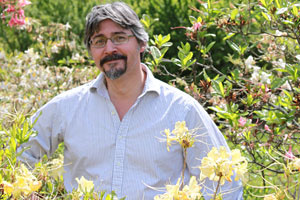
The South Asian Studies Program (SASP) will kick-off its fall semester activities with a lecture by Paul Robbins titled, “Coffee, Frogs, and Workers: Conservation in India during the Anthropocene." The event is free and open to the public and will be held on Thursday, October 29, from 5:00 - 6:30 pm in UCC 2390 (Executive Boardroom, 2nd Floor UCC).
Professor Robbins' talk will focus on the demise of wildlife "enclosures" and the expansion of conservation efforts into humanized landscapes in India. With this transition, he writes, basic questions arise about the survival of people and other species. Are these developed landscapes of a quickly-changing planet amenable to the mission of conservation? Can chaotic, semi-humanized environments be coaxed to protect rare endemic species? When and under what political and economic conditions? Can well-being be assured for wildlife, owners, and workers? The research described here seeks to answer these questions by investigating biodiversity, plantation export economics, and labor dynamics in the booming commodity production landscapes of coffee, rubber, and arecanut in southern India. The conclusion: wild species are thriving in places that are not wilderness at all, but their fates are intertwined with that condition and aspirations of the rural working poor.
Paul Robbins is a professor and director of the Nelson Institute for Environmental Studies at the University of Wisconsin-Madison. His research addresses questions spanning conservation conflicts, urban ecology, and environment and health interactions. He has done extensive fieldwork in rural India, where he has focused his work on the politics surrounding forestry and wildlife conservation in Rajasthan, India, as well as recent research examining the wealth of biodiversity (frogs, birds and mammals) in commercial coffee and rubber plantations throughout south India. Robbins has also led national studies of consumer chemical risk behaviors in America, including research on the abiding passion of Americans for their lawns and mosquito management policies in the Southwest.
This event is sponsored by SASP, UI Center for Global & Regional Environmental Research, UI International Programs, UI Department of Geography, UI Department of Anthropology, and Office of the Provost. To see the full list of SASP events for 2015, visit http://international.uiowa.edu/sasp/events.
Individuals with disabilities are encouraged to attend all University of Iowa-sponsored events. If you are a person with a disability who requires a reasonable accommodation in order to participate in this program, please contact Meena Khandelwal in advance.